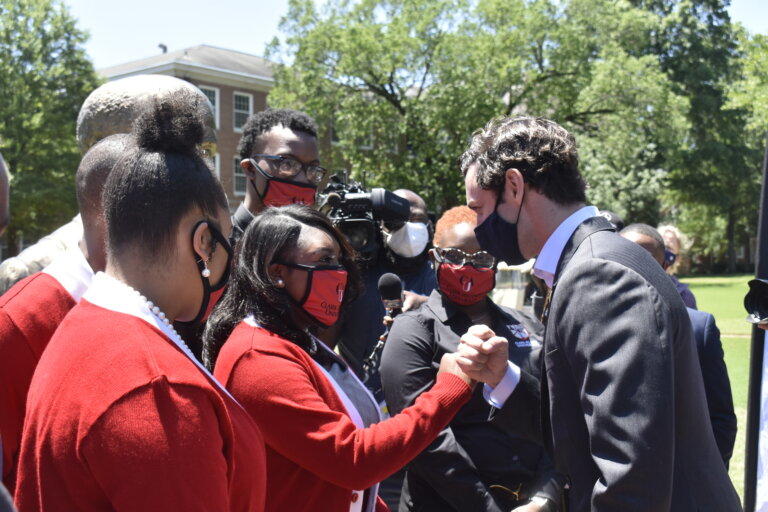
Caption
Sen. Jon Ossoff speaks with Atlanta HBCU students after delivering remarks at Clark Atlanta University May 7.
Credit: Ross Williams/Georgia Recorder

Sen. Jon Ossoff speaks with Atlanta HBCU students after delivering remarks at Clark Atlanta University May 7.
Atlanta’s historically Black colleges and universities are set to receive just under $32 million combined in grants from the American Rescue Plan, part of the $3 billion set aside for HBCUs in the $2 trillion relief package signed by President Joe Biden in March.
“HBCUs are gems in our nation’s system of higher education,” U.S. Sen. Jon Ossoff told a group of Clark Atlanta University staff and students during a campus visit Friday. “HBCUs provide a vital service not just to the Black community here in Georgia and across the country, but to the entire nation and to the entire world. Please count on me as a friend and an ally and a staunch advocate for Georgia’s HBCUs and HBCUs nationwide.”
Under the plan, Clark Atlanta University will receive $16.4 million, Morehouse College will receive $7.8 million, Morehouse School of Medicine will receive $358,000 and Spelman College will receive $7.4 million.
Ossoff said the money will reach the private schools in the coming weeks. Half of the money is to be set aside for student assistance, including emergency financial aid to students experiencing financial hardship because of the pandemic. But school leaders will have “significant discretion and flexibility” for how to spend the balance, Ossoff said.
The aid is welcome, as Atlanta’s HBCUs have been doing more with less for years, said Spelman College President Mary Schmidt Campbell.
“We have an infrastructure that dates over 150 years on our collective campuses, and we manage to have spectacular academic outcomes, despite the fact that historically, our infrastructure received underinvestment,” she said.
HBCUs spend about two-thirds of the revenue per student compared to colleges in general, according to the Brookings Institute, but students are happier there than their counterparts in other traditional colleges.
Morehouse College graduating senior Cameron Nolan of Jackson, Mississippi, started college at a traditional university, but he said he never felt at home until he transferred to the Atlanta institution.
“I went to a (predominantly white institution), and they said ‘we have an engineering club, and then we have a Black engineers club. We have a student union, and we have a Black student union.’ There was a sense of segregation,” said Nolan, an economics major. “I’m so thankful that I chose Morehouse College. It was hands down the best decision I could have possibly made.”
His friend, rising senior Jaden Cody, agreed, but said he knew from a young age he would be a Morehouse man.
“I come from a Spelman and Morehouse family, so I would almost say I didn’t have a choice,” he said with a laugh. “But I felt like I made the perfect decision for me. Morehouse and the Atlanta University Center have poured so much into me, have given me everything that I’ve needed, have honestly made me the man that I am today, the leader that I am today.”
Data shows the two are not alone: 58% of Black students at HBCUs said they felt their professors cared about them as a person, compared with 25% of Black students at non-HBCUs, according to Gallup polling. And graduates of HBCUs were 11% more likely to tell pollsters they were thriving financially than their Black peers who graduated from non-HBCUs.
Historically Black colleges and universities make up 3% of U.S. colleges and universities, but they enroll 10% of all African American students and produce nearly 20% of all African American graduates, including 25% of African American STEM graduates, according to the United Negro College Fund. And Georgia HBCU graduates can expect to earn an additional $980,000 over their lifetimes on average.
But nationwide, HBCUs have been struggling with lower enrollment rates long before the pandemic. Enrollment decreased by 7% between 2010 and 2018, according to the U.S. Department of Education.
The Black colleges are competing for the same students as other schools with much deeper pockets, said Morehouse President David Thomas.
“The colleges that schools like Morehouse or Clark or Spelman compete against, many of them have billion-plus dollar endowments, and that allows them to invest in their infrastructure in ways that we cannot, and that’s the direct product of the wealth gap that has been created over the centuries,” he said.
Campus facilities may be a little more dated than at other schools, Cody said, but that doesn’t matter to him.
“Whatever house we are in, wherever we sleep, it may not look like the ones at Georgia Tech or the ones at Harvard or the ones at any of these other schools, but we are still producing the same caliber of leader, the same caliber of scholar,” he said. “We’re still producing Rhodes Scholars, we’re still producing people who go on to do research, people who go on to lead universities, to lead the world.”
Ossoff was joined on the Clark campus by two of Georgia’s Democratic representatives, Rep. Nikema Williams and Rep. Hank Johnson. Both of them are graduates of HBCUs — Williams graduated from Talladega College and Johnson from Clark.
Referencing Vice President Kamala Harris, another HBCU graduate, Williams left the students with a message of optimism.
“When we look at our vice president as a graduate of Howard University, and looking at the members of the United States Congress, especially those gathered here today with Congressman Johnson, an alum of Clark Atlanta University, don’t let anyone tell you that HBCUs do not prepare you for the real world,” she said.
This story comes to GPB through a reporting partnership with Georgia Recorder.